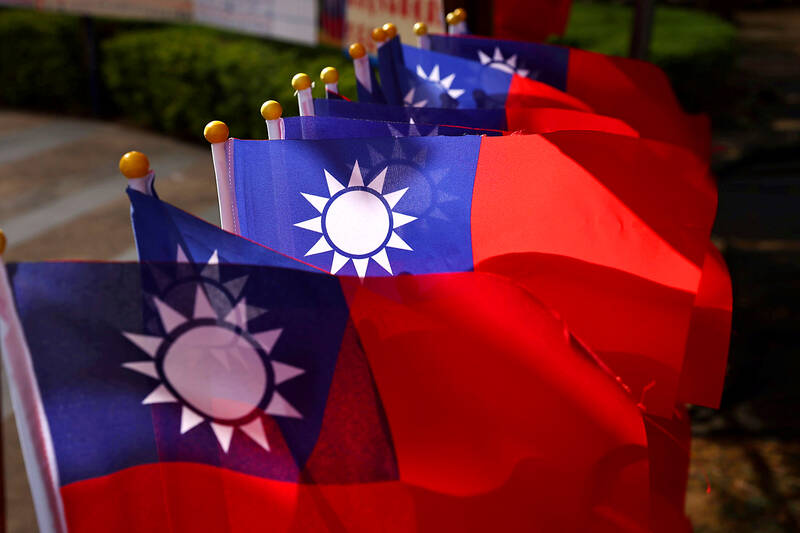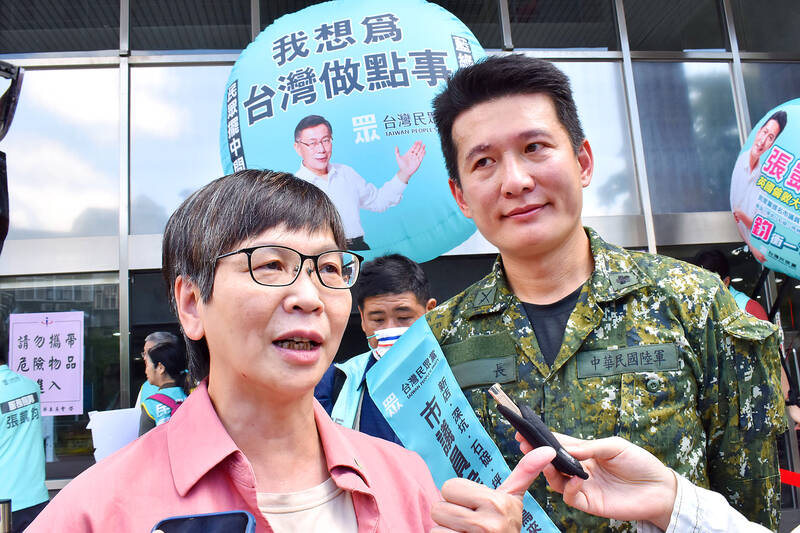The Pentagon moving its Taiwan portfolio to the office of US Deputy Assistant Secretary of Defense for China Michael Chase from its East Asia office has prompted concern among some lawmakers in Taiwan, as Washington insiders have said the shift sends Beijing the wrong message.
The Politico news organization on Friday reported the administrative change, saying in a headline that the Pentagon was “watering down” its focus on Taiwan.
The change is “a shift that lawmakers and former officials say sends the wrong signal to Beijing as the Chinese military steps up drills around [Taiwan],” the Politico report said.

Photo: Reuters
US Department of Defense spokesman John Supple on Friday said that the move aligns staff and leadership with the appropriate bureaucratic structures at other agencies, including the US Department of State.
“In no way does this shift reflect a change in our one China policy, our commitment to allies and partners, or focus on preserving a free and open Indo-Pacific,” Supple said.
However, Heino Klinck, former deputy assistant secretary of defense for East Asia in the administration of former US president Donald Trump, said that “the Chinese will not interpret this as a coincidence.”

Photo: CNA
“My concern is that again we are unintentionally messaging both mainland Taiwan and the region writ large and globally that in the wake of Speaker [Nancy] Pelosi’s visit and in the wake of what many are referring to as the fourth Taiwan Strait crisis, we are making policy adjustments, policy changes that favor Chinese positions,” Klinck said, referring to the US House of Representatives speaker.
Pelosi visited Taiwan last month, following which China launched military exercises around the nation lasting several days.
In Taipei, the Ministry of Foreign Affairs yesterday said that it believes the move does not indicate a change in US emphasis on Taiwan’s security, adding that it does not comment on the affairs of the US government.
Democratic Progressive Party (DPP) Legislator Chao Tien-lin (趙天麟) said that the US defense department’s move at this juncture was “unexpected,” but he urged pundits not to rush to conclusions.
DPP Legislator Hsu Chih-chieh (許智傑) said that placing Taiwan under the office responsible for China policy “is inappropriate,” as it should focus on handling matters regarding Beijing only.
The Pentagon should transfer Taiwan affairs back to the East Asia office to maintain Taiwan’s place on the international stage, Hsu said.
Taiwan People’s Party Legislator Tsai Pi-ru (蔡壁如) said that Taiwan has yet to benefit from the Taiwan policy act — approved by a US Senate committee on Wednesday — but the country is suffering for it.
Tsai said she would urge President Tsai Ing-wen (蔡英文) to protest the move, as it places Taiwan under China.
Separately, Taiwan Society chairman Lee Chuan-hsin (李川信) said on Friday that the Taiwan policy act is the most significant US legislation in support of Taiwan since the Taiwan Relations Act of 1979, and urged overseas Taiwanese to step up lobbying efforts for the bill’s passage.
Lee also urged Japan and other Asia-Pacific nations to voice support for the new act.
Taiwan Association of University Professors secretary-general Hsu Wen-tang (許文堂) said that most experts believe that the Taiwan Strait situation would put Taiwan in danger by 2027.
Taiwan must be armed and prepared for war, Hsu said, urging the Tsai administration to lobby the US for increased weapons sales, and urge more support from Republicans and Democrats in Washington, Hsu said.

SECURITY: As China is ‘reshaping’ Hong Kong’s population, Taiwan must raise the eligibility threshold for applications from Hong Kongers, Chiu Chui-cheng said When Hong Kong and Macau citizens apply for residency in Taiwan, it would be under a new category that includes a “national security observation period,” Mainland Affairs Council (MAC) Minister Chiu Chui-cheng (邱垂正) said yesterday. President William Lai (賴清德) on March 13 announced 17 strategies to counter China’s aggression toward Taiwan, including incorporating national security considerations into the review process for residency applications from Hong Kong and Macau citizens. The situation in Hong Kong is constantly changing, Chiu said to media yesterday on the sidelines of the Taipei Technology Run hosted by the Taipei Neihu Technology Park Development Association. With

A US Marine Corps regiment equipped with Naval Strike Missiles (NSM) is set to participate in the upcoming Balikatan 25 exercise in the Luzon Strait, marking the system’s first-ever deployment in the Philippines. US and Philippine officials have separately confirmed that the Navy Marine Expeditionary Ship Interdiction System (NMESIS) — the mobile launch platform for the Naval Strike Missile — would take part in the joint exercise. The missiles are being deployed to “a strategic first island chain chokepoint” in the waters between Taiwan proper and the Philippines, US-based Naval News reported. “The Luzon Strait and Bashi Channel represent a critical access

‘FORM OF PROTEST’: The German Institute Taipei said it was ‘shocked’ to see Nazi symbolism used in connection with political aims as it condemned the incident Sung Chien-liang (宋建樑), who led efforts to recall Democratic Progressive Party (DPP) Legislator Lee Kun-cheng (李坤城), was released on bail of NT$80,000 yesterday amid an outcry over a Nazi armband he wore to questioning the night before. Sung arrived at the New Taipei City District Prosecutors’ Office for questioning in a recall petition forgery case on Tuesday night wearing a red armband bearing a swastika, carrying a copy of Adolf Hitler’s Mein Kampf and giving a Nazi salute. Sung left the building at 1:15am without the armband and apparently covering the book with a coat. This is a serious international scandal and Chinese

COUNTERINTELLIGENCE TRAINING: The ministry said 87.5 percent of the apprehended Chinese agents were reported by service members they tried to lure into becoming spies Taiwanese organized crime, illegal money lenders, temples and civic groups are complicit in Beijing’s infiltration of the armed forces, the Ministry of National Defense (MND) said in a report yesterday. Retired service members who had been turned to Beijing’s cause mainly relied on those channels to infiltrate the Taiwanese military, according to the report to be submitted to lawmakers ahead of tomorrow’s hearing on Chinese espionage in the military. Chinese intelligence typically used blackmail, Internet-based communications, bribery or debts to loan sharks to leverage active service personnel to do its bidding, it said. China’s main goals are to collect intelligence, and develop a